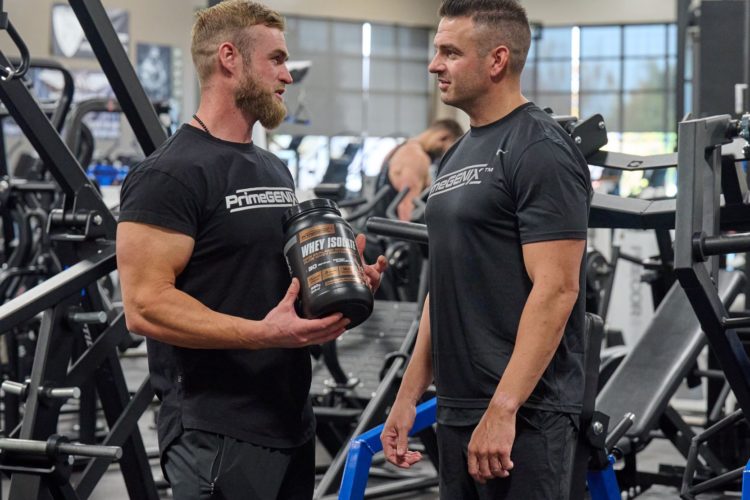Protein, carbohydrates, and fats make up the three macronutrients consumed every day in a standard diet. There are many misconceptions about protein, especially as it relates to building muscle.
Protein is the only macronutrient that can build and repair muscle tissue. This is due to the nitrogen component that is unique to protein. Neither fat nor carbohydrates contain nitrogen.
Fat can convert to carbohydrates in the body through a process called gluconeogenesis. Carbohydrates can convert to fat in the body, through a process called de novo lipogenesis.
However, neither fats nor carbohydrates can convert to protein. This is part of the reason why protein is such a critical component of the diet. It is literally irreplaceable.

How Much Protein You Need to Build Muscle
There is often confusion about protein needs when it comes to building muscle. Many people cite the recommended daily allowance (RDA) of protein which is 0.8g per kilogram of body weight. For a 200lb/91kg male, this is only 73 grams of protein.
However, it’s important to note two things regarding nutritional RDA.
One is that this value is considered the minimum amount necessary for survival, which is not necessarily an optimal amount. This goes for all nutrients.
Second is that the RDA is for sedentary individuals, not for athletes. People who exercise have different needs than the general population. Again, this goes for other nutrients aside from protein.
The optimal protein intake for the purpose of building muscle is 2g per kilogram of bodyweight [1]. This equates to a little under 1g per pound of body weight. Those who truly enjoy protein should not fear if they go beyond the 2g/kg intake. Studies have been done up to 4.4g of protein per kilogram of bodyweight with no adverse effects [2] (provided they had no pre-existing medical conditions).
Best Protein Sources
In the body, protein breaks down into individual amino acids. These amino acids are then rebuilt to help repair tissue and serve the other functions that protein provides.
Amino acids can be classified as essential and non-essential. Non-essential amino acids can be synthesized by the body. Essential amino acids must be consumed via diet and/or supplementation.
A protein source containing all 9 essential amino acids is considered a “complete” protein source. It’s much easier to consume complete protein sources than it is to mix and match foods until all essential amino acid needs are met.
Leucine is a particularly important amino acid, as it is responsible for jumpstarting protein synthesis. While you need all essential amino acids to build and repair muscle, leucine is the driver of this process. A quality protein source will have 2-3g of leucine per serving.
Protein synthesis also increases with resistance exercise like lifting weights. The combination of resistance exercise and a high protein diet is the key to optimal muscle growth.
Complete protein sources include chicken, turkey, beef, fish, dairy products, eggs, and whey protein supplements. Unless you have specific dietary restrictions, these foods are likely staples in your meal plan already.
Vegans will have to be more meticulous with their food choices to get enough complete protein. They often have to combine food sources to make a complete protein. For example, rice and beans are incomplete on their own, but form a complete protein when combined.
Vegans should not be discouraged as many have been able to develop great physiques. It simply takes a little more effort. Vegetarians have less restrictive diets, and will usually opt for eggs, cheese, and other dairy products (depending on the type of vegetarianism).
How Many Meals Per Day
Unlike carbohydrates and fats, protein cannot be stored in the body in any meaningful way.
Carbohydrates can be stored in muscle and liver as glycogen. The average person can store about 400g of carbs as glycogen. A person who carries more muscle will have more room for storage.
Fats can be stored in adipose tissue. This fat storage is virtually limitless. Conceivably, a person can keep getting fatter and fatter if their caloric intake is consistently high. Fat storage will simply continue to grow.
Since protein cannot be stored, it must be consumed at regular intervals to build muscle at a high rate.
The old bodybuilding protocol of 6 meals per day is a bit excessive, though not technically wrong. Studies show that 4 high protein meals evenly spaced throughout the day is optimal to build muscle [3].
To calculate the amount of protein per meal, simply divide your daily protein intake in grams by 4. This will be your protein aim on a meal-to-meal basis. The meals should be spaced out by 3-5 hours.
This meal frequency is not too different from the norm of breakfast, lunch, dinner, and a snack. Of course, the meals and the math will not work out perfectly each time. However, things will work out over time with consistency in your nutrition plan.

Protein Supplements
People sometimes question the utility of protein supplements. With a newfound understanding of how protein works from the information in this article, it’s much easier to see why they are useful.
When tracking protein intake, it quickly becomes apparent that getting optimal protein on a day-to-day basis is difficult with food alone. You can only eat so much chicken breast and eggs.
Protein supplements provide a convenient, complete source of protein. They can be prepared and consumed in minutes.
Whey isolate is considered the highest quality protein supplement. It mixes into a thin texture and isn’t too filling. In addition, the macronutrient content is as lean as it gets. Whey isolate powders are virtually 100% protein with only minimal carbohydrates and fats.
This profile allows it to fit into any diet. It’s lean enough to fit in with anyone looking to lose weight. On the other hand, those looking for extra calories can easily blend ingredients like peanut butter, fruit, or oats.
Conclusion
While fitness pundits argue over low fat versus low carb, protein continues to fly under the radar. Protein is responsible for muscle growth and repair, and plays a role in immune system function along with structural health.
Many people do not consume enough protein to optimize for muscle growth and health, even amongst active individuals.
When people begin to weigh food and track their macronutrient intake, they soon realize how difficult it can be to get one gram of protein per pound of body weight. Whey protein supplementation can help reach this goal.
References
1. https://pubmed.ncbi.nlm.nih.gov/17908291/
2. https://jissn.biomedcentral.com/articles/10.1186/1550-2783-11-19
3. https://jissn.biomedcentral.com/articles/10.1186/s12970-018-0215-1

